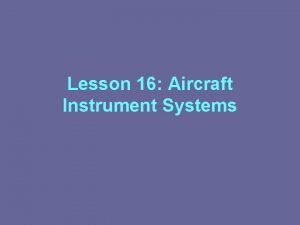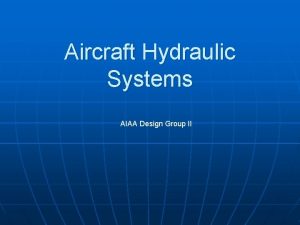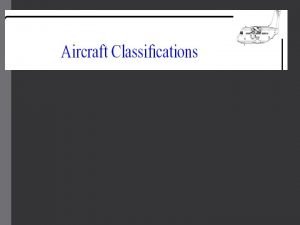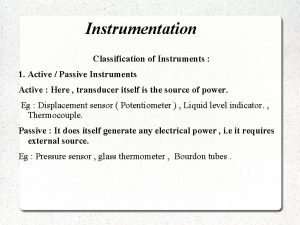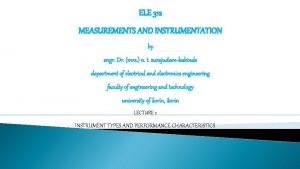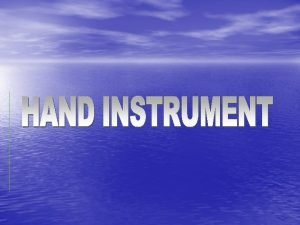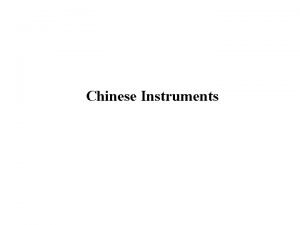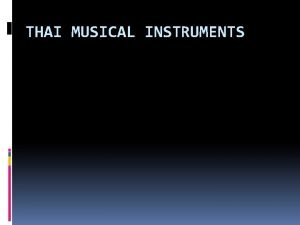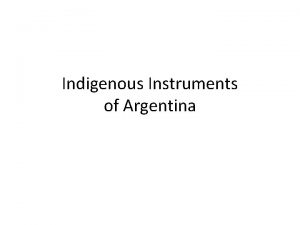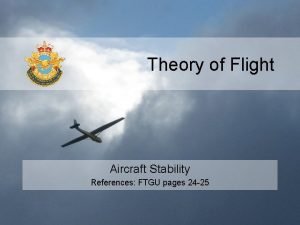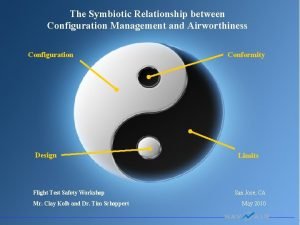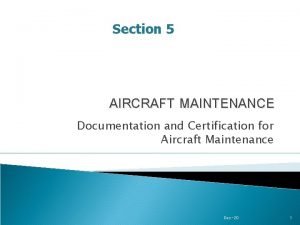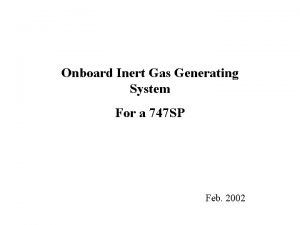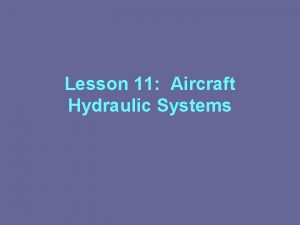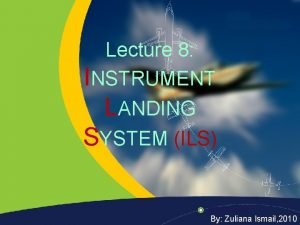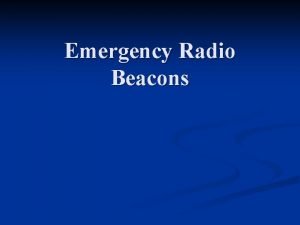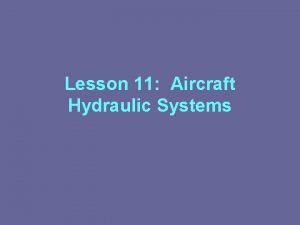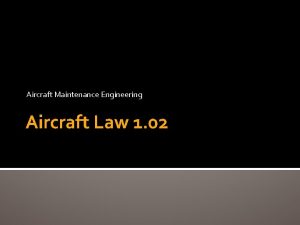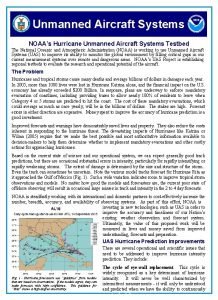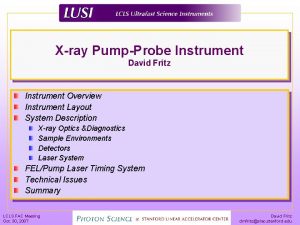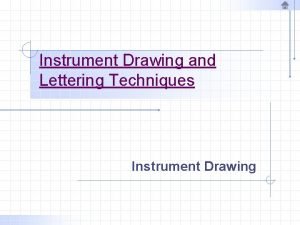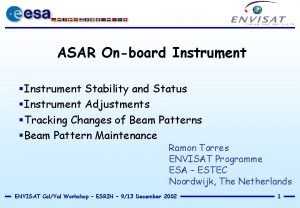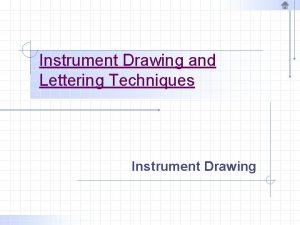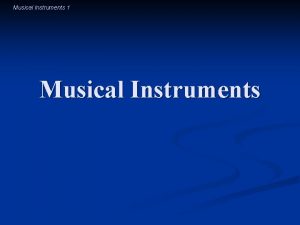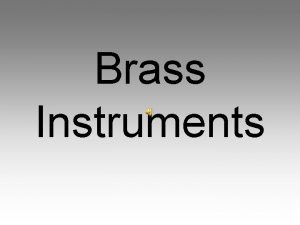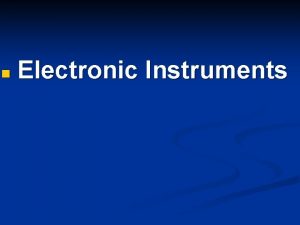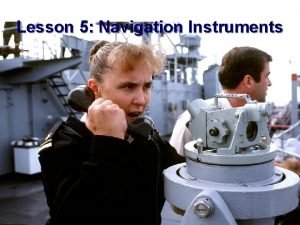Lesson 16 Aircraft Instrument Systems Classification Of Instruments



































- Slides: 35

Lesson 16: Aircraft Instrument Systems

Classification Of Instruments • Flight Instruments • Engine Instruments • Auxiliary Instruments

Flight Instruments • Those that help visualize the attitude, location and speeds of the aircraft. • Those which indicate the relationship to the air through which we are flying • Those which relate to our position in space without considering the air.

Pitot-static System • Dynamic Air Pressure - Pressure caused by moving air. • Ambient Static Air Pressure - Pressure of nonmoving air just outside the aircraft.

Pitot-static System

Pitot Head

Pitot Head

Flush Static Port



Airspeed Indicator • Differential pressure gauge that measures the difference between dynamic and ambient static air pressure.

Airspeed Indicator • Indicated airspeed • The speed of an aircraft as shown on the airspeed indicator. • True airspeed • The speed at which an aircraft is moving relative to the surrounding air. • Calibrated airspeed • Indicated airspeed of an aircraft, corrected for installation and instrument errors.

Altimeter • A barometer that measures the absolute pressure of the air.

Altimeter • Indicated Altitude • The altitude shown by an altimeter set to current altimeter setting. • Pressure Altitude • Height above the standard pressure level of 29. 92 in. Hg. • Density Altitude • Pressure altitude corrected for nonstandard temperature variations.

Altimeter • True Altitude • The actual height of an abject above mean sea level. • Absolute Altitude • Actual height above the surface of the earth, either land or water.

Vertical Speed Indicator • The rate of climb indicator • Serves only as a backup for the altimeter and airspeed indicator as a pitch indicating instrument. • Helps the pilot establish a rate of climb or descent.

Blockage Of The Pitot-Static System • Pitot Tube • Affects only the airspeed indicator, but a clogged static system affects all three pitotstatic instruments. • If the pitot tube is blocked and its drain hole remains open, the airspeed reading will drop to zero. • If both pitot tube and the drain hole clog, the airspeed indicator will react like an altimeter.

Blockage Of The Pitot-Static System • Static port • The indicated airspeed increases as the airplane descends and decreases when it climbs. • The altimeter: air pressure in the system will not change and neither will your indicated altitude. • VSI continually indicates Zero.

Gyroscopic Instruments

Gyroscopic Instruments • Turn coordinator • Attitude indicator • Heading indicator

Gyroscopic Instruments • Rigidity In Space – Once a gyroscope is spinning, it tends to remain in a fixed position in space and resist external forces applied to it.

Gyroscopic Instruments • Precession – The tilting or turning of a gyro in response to pressure. • The reaction to this force occurs in the direction of rotation, approximately 90° ahead of the point where the force was applied.

Sources Of Power • Gyroscopes may be operated by electrical power or by a vacuum (suction) system.

Sources Of Power

Attitude Indicator • Vacuum powered instrument which senses pitching and rolling movements about the airplanes lateral and longitudinal axes.

Attitude Indicator

Attitude Indicator

Directional Gyro • Vacuum powered instrument which senses yaw movement of the airplane about the vertical axis. • Horizontal card directional gyro

Directional Gyro • Vertical card directional gyro

Rate Gyros • Turn And Slip Indicator • Turn Coordinator • Inclinometer

Rate Gyros

Turn Coordinator

Floating Magnet-type Magnetic Compass

Engine Instruments

Engine Instruments
 Aircraft instrument system
Aircraft instrument system Aircraft hydraulic systems
Aircraft hydraulic systems Aircraft group classification
Aircraft group classification Prap definition
Prap definition Null type instruments
Null type instruments Indicating instruments and instruments with a signal output
Indicating instruments and instruments with a signal output Chapter 18 basic chairside instruments and tray systems
Chapter 18 basic chairside instruments and tray systems Periodontal instruments classification
Periodontal instruments classification Classification of kubing instrument
Classification of kubing instrument Hornbostel sachs membranophone
Hornbostel sachs membranophone Dental instruments classification
Dental instruments classification Biomedical instrumentation system
Biomedical instrumentation system Spreaders and pluggers ppt
Spreaders and pluggers ppt Cleoid discoid carver uses
Cleoid discoid carver uses Membranophone aerophone idiophone chordophone
Membranophone aerophone idiophone chordophone Obturation materials
Obturation materials Types of dental burs
Types of dental burs Sanxian classification
Sanxian classification Instrumental music of india pakistan and israel
Instrumental music of india pakistan and israel Kudu horn instrument classification
Kudu horn instrument classification Tarkas instrument classification
Tarkas instrument classification It is the combination of piphat and khruang-sai
It is the combination of piphat and khruang-sai Erkencho instrument
Erkencho instrument Keel surface of aircraft
Keel surface of aircraft Aircraft configuration management
Aircraft configuration management Airplane maintenance manual
Airplane maintenance manual Aircraft maintenance planning and control
Aircraft maintenance planning and control Ogv aviation
Ogv aviation Aircraft onboard inert gas generation system
Aircraft onboard inert gas generation system Log book entries
Log book entries Aircraft hydraulic system components
Aircraft hydraulic system components Marker ils
Marker ils Robert fugard
Robert fugard Grumman aircraft engineering corporation
Grumman aircraft engineering corporation Search and rescue aircraft signals
Search and rescue aircraft signals Pdr team
Pdr team
